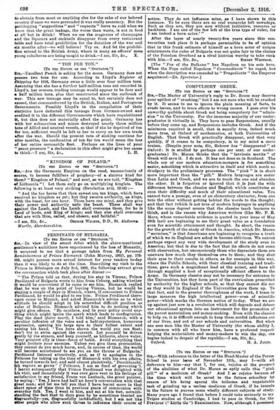FERDINAND OF BULGARIA.
[To THE EDITOR OP THE " SPECTATOR.") Bra,—In view of the smart echec which the above-mentioned gentleman's ambitions have experienced by the loss of Monastir, it occurred to me that a passage taken from My Personal Reminiscences of Prince Bismarck (John Murray, 1902), pp. 178- 180, might possess more actual interest for your readers to-day than it was likely to do at the time. Describing my visit to the Prince in Kiesingen on July 3rd, 1892, the following extract gives the conversation which took place after dinner :— The Prince told us that, during his stay in Vienna, Prince Ferdinand of Bulgaria wrote to him from Coburg, asking whether it would be convenient if he came to see him. Bismarck replied that he was on the point of leaving Vienna, but he would be staying a couple of days in Munich, where, if convenient to Prince Ferdinand, he would be glad to see him. Prince Ferdinand there- upon came to Munich, and asked Bismarck's advice as to what attitude he should adopt in his somewhat difficult position as ruler of Bulgaria. Bismarck advised him to do nothing which might give offence. ' Be cautious, and in your policy avoid any- thing which might ignite the spark which leads to conflagration. Play the dead (faire mort), I told him,' said Bismarck, with a peculiar inflexion of the voice and a half-mysterious, humorous expression, opening his large eyes to their fullest extent and raising his hand. You have shown the world you can float; don't try to swim against the current. Let yourself be driven gently by the stream, and keep yourself, as hitherto, above water. Your greatest ally is time—force of habit. Avoid everything that might Irritate your enemies. Unless you give them provocation, they cannot do you much harm, and, in course of time, the world will become accustomed to see you on the throne of Bulgaria.' Ferdinand listened attentively, and, as if to apologise to the Princess for taking up the time of Bismarck with his own affairs, he turned towards her, and said almost plaintively, Durehlaucht, fah regiere so gerno ' (` Princess, I am so fond of governing'). I learnt subsequently that Prince Ferdinand was delighted with his visit, and immediately It was over gave rent to his feelings of satisfaction to my friend, Franz von Lenbach, the great painter, by saying: ' Yes, I have had half an hour's conversation with that great man; and let me tell you that I have learnt more in that short space of time than in previous years of communion with everyday folk. Yes, I went to him, and sat at his feet, notwith- standing the fact that in days gone by he sometimes treated me gisgracefully—yes, disgracefully (schandlich), but I am not like Other people who allow such things to influence their course of
action. They do not influence mine, as I have shown in this instance. To be sure there are no real monarchs left nowadays. Such as they are, they are men without initiative, resource or backbone. I am one of the few left of the true type of ruler, for I am indeed a born actor.' " After the lapse of nearly twenty-five years since this con- versation took place it is perhaps permissible to be of opinion that in this frank estimate of himself as a born actor of unique attainments the ruler of Bulgaria was not quite fair to the claims of the Potsdam Overlord as a rival histrion worthy to take rank
[The " Fox of the Balkans" has Napoleon on his side here. When the Pope called Napoleon "Commediante " he raged, but when the description was amended to " Tragediante" the Emperor acquiesced.—En. Spectator.]












































 Previous page
Previous page